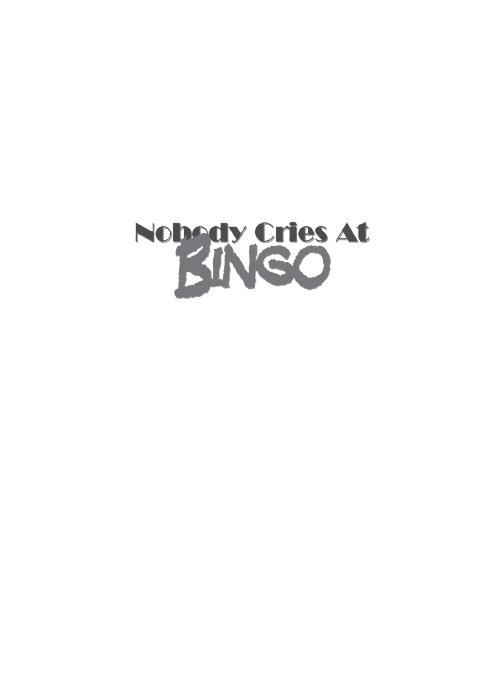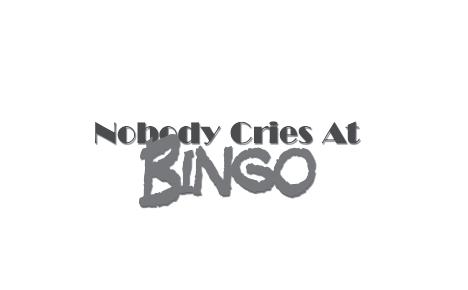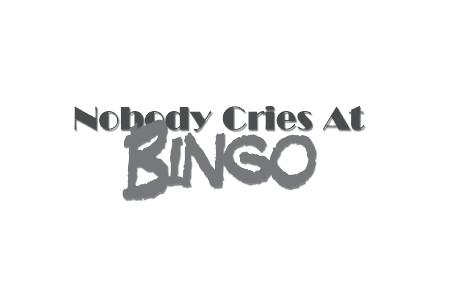Nobody Cries at Bingo
Read Nobody Cries at Bingo Online
Authors: Dawn Dumont
Tags: #Native American Studies, #Social Science, #Cultural Heritage, #FIC000000, #Native Americans, #Biography & Autobiography, #Ethnic Studies, #FIC016000




dawn dumont

© Dawn Dumont, 2011
All rights reserved
No part of this publication may be reproduced or transmitted in any form or by any means, graphic, electronic or mechanical, including photocopying, recording, or any information storage and retrieval system, without permission in writing from the publisher or a licence from The Canadian Copyright Licensing Agency (Access Copyright). For an Access Copyright licence, visit
www.accesscopyright.ca
or call toll free to 1-800-893-5777.
Thistledown Press Ltd.
118 - 20th Street West
Saskatoon, Saskatchewan, S7M 0W6
www.thistledownpress.com
Library and Archives Canada Cataloguing in Publication
Dumont, Dawn, 1978-
Nobody cries at bingo / Dawn Dumont.
ISBN 978-1-897235-84-3
I. Title.
PS8607.U445N63 2011 C813'.6 C2011-901709-1
Cover painting
Neighbourhood Watch
by Jim Logan
Cover and book design by Jackie Forrie
Printed and bound in Canada

Thistledown Press gratefully acknowledges the financial assistance of the Canada Council for the Arts, the Saskatchewan Arts Board, and the Government of Canada through the Canada Book Fund for its publishing program.

dawn dumont
For Nancy and Rose
C
ONTENTS
The Reserve vs. Satan's Brides
I
WAS BORN IN A SMALL
S
ASKATCHEWAN TOWN
called Balcarres. The town had given itself the nickname, the “Pride of the Prairies,” which is a pretty bold statement for a community that boasts more boarded up stores and businesses than regular ones.
Shortly after my debut, I was relocated to the Okanese reserve via a ride in our grandparents' car. Okanese is Cree for Rosebud. The reserve doesn't really have a nickname although many people have called it the “armpit of the universe,” usually after they lost an election.
We lived on the Okanese reserve in our green house on the hill with our mom and, sometimes, our dad, until our parents broke up for the 6,945th time. As they say, the 6,945th time is always the charm and Mom really committed herself to this breakup. She packed up our belongings in black garbage bags and moved me and my three siblings â my older sister Tabitha, my younger sister Celeste, and my younger brother David â six hours away from our home to The Pas, Manitoba.
The Pas calls itself the “Gateway to the North,” as though that was something people were actively seeking. The word Gateway is a misnomer. The Pas, with its movie theatre that showed only one movie at a time, its grocery stores that didn't sell ripe vegetables, and community centres devoted to the holy religion of hockey, closed off more opportunities than it opened. Of course, The Pas had plenty of other stuff; it was abundant in opportunities to wear toques, balaclavas, and long underwear.
When we first got to Manitoba, we stayed with my aunts and their kids. They provided us with a single bedroom where we slept together in the same bed, all of us arranged around our mom to get maximum contact with her body. When Mom managed to find a house to rent, our aunts helped us move in their big pickup trucks. Moving day was quick because we had so many helping hands and because we had so little.
Our new home was located in Young's Point, a small community about ten minutes outside of The Pas. Young's Point had a square shape, with a skinny dirt road encircling it like a running track. In the centre, facing outwards, were tiny homes with one or two bedrooms. Some had running water; some did not. The sign that led into the housing complex read, “Young's Point, God Lives Here.” Despite all evidence to the contrary, we took this as a good sign-sign.
All of our cousins declared that our two-bedroom bungalow was “cool,” though most adults would generally agree that it was dump. One of our older cousins, Norman, showed us how our kitchen window would serve us. “You could see a tornado coming through this window and then you could run out the back door!” He demonstrated by screaming and running out the door.
Norman was one of our favourite cousins because he liked to wrestle and he made us laugh all the time. He lived with my aunt and uncle as a foster child. He was with them for so long that he felt like a full cousin.
“Norman is so silly. Everyone knows the only place you can hide from a tornado is in the basement!” I told Celeste.
Celeste looked thoughtful. “Where is the basement?”
We went through the house opening and closing doors. Finally we went to our expert on everything housing and non-housing related. “Tabitha, where's the basement?”
“There isn't any.”
“Where do we go when there's a tornado, then?”
It was Tabitha's turn to look thoughtful. “I could always tie you to a tree.”
I suspected she was kidding. She didn't smile so it was possible she was telling the truth. I would have tattled on her but a part of me wanted to be tied to a tree. Then I could see the tornado and be safe. Celeste agreed.
Our fear of tornados was not unfounded. Even though we were living in northern Manitoba and there hadn't been a tornado in about a hundred years, we were originally from Saskatchewan where they were a regular occurrence. Mom brought her fear of tornadoes everywhere she went. “Look at the cloud, look how it's turning black and making a funnel. That's how they start. Next thing you know, your house is flying through the air.”
Celeste's eyes lit up. “Like
The Wizard of Oz
?”
“No! Like . . . like . . . a horrible, bloody car crash.” Mom wanted her kids to share her fears.
Every week a water truck drove onto Young's Point and pulled up in front of the houses to fill the tanks sitting at the back. My siblings and I were small and watched the water truck from our kitchen window, our cereal-smeared faces lit with glee to see any vehicle larger than the two door beaters that dominated our neighbourhood.
Tabitha and I went to school every day on a big yellow bus that roared through the complex every morning. It dropped us off at the Opasquayak School located on the south end of town. As a Kindergarten student, I wasn't allowed to play with the big kids at recess. We had our own place to play, a small fenced off yard with two half-full sand pits that reeked of urine and boredom, and one set of swings â if you were lucky enough to get one of the swings, you stayed on it until recess was over, no matter that your legs went dead. On the other side of the chain link fence was the big kids' area. They had multiple swing sets, slides, a merry-go- round and ball diamonds. Older kids ran through the area screaming with an exuberance not seen since ancient Greece banned bacchanalia. I yearned to be on the other side of the fence. But I was mindful of the rules and even when my older sister commanded me to crawl through a hole in the fence separating the big kids from the little kids, I shook my head and yelled, “I can't. I'll get in trouble!”
She called back, “Quit being a brownnoser and just come!” I stared at the hole and willed my body to move. It was no use; I sincerely believed the sky would fall on me if I broke the school's rules. So instead, I stood there on my side of the chain link fence staring at my sister while she and her friends watched me from the other side, with a “What the hell is she doing?” look on their faces until the bell rang. The worst part was seeing the disappointment written into the chubby cheeks of my sister's face â I hated letting her down.
Kindergarten was a confusing time. I spent most of my day trying to figure out ways to please the teacher but always ended up annoying her. She asked us to rotate our way through the toys, rather than hogging one to ourselves. I did what she asked with enthusiasm, even going to the point of prying toys out of other kids' hands when I felt they had played with them long enough.
